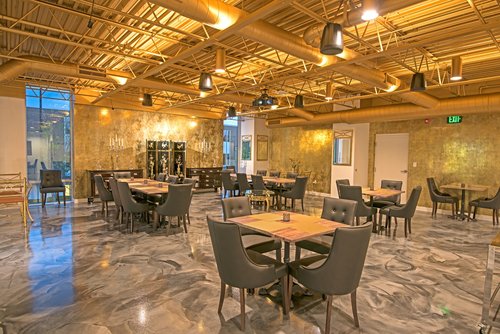
MANCHESTER, NH – Cabonnay restaurant is the latest casualty of the city’s unpredictable restaurant scene, announcing with little fanfare and no official explanation last week its permanent closure, via the web.
The multi-million dollar renovation of the industrial space at 55 Bridge St. was completed in spring of 2017 and the restaurant opened with a splash — followed by a lukewarm reception from the public. Mixed reviews on Yelp! summarize the restaurant’s struggles to find its place in Manchester, with star ratings vacillating from 1 to 5 with everything in between. Some called it the “best dining experience” they’d ever had. Others said it was “pretentious without perfection,” generally garnering lots of kudos for the food with less enthusiasm for things like staff, wait time and ROI.

Despite industry accolades for innovation and cuisine – Cabonnay was named among the 50 Most Beautiful Restaurants in the U.S. by MSN, 2017 Hot New Restaurant by New Hampshire Magazine, one of Yankee Magazine’s Best Dining NH 2017 picks, and was featured in the Boston Globe as part of Manchester’s “rising” downtown dining scene – the multi-level urban wine house restaurant never fully launched with enough consistency to sustain it. Cornelius deJong, who owned the restaurant, evidently decided a new year would not be enough to turn things around.
deJong declined to comment on Cabonnay’s closing for this report. One sentence as posted on Cabonnay’s website reads: “The past two years have a been journey for which we are very thankful for. We’ve had incredible staff and their dedication to a farm-to-table experience is lauded,” followed by the many industry honors earned by the restaurant.
But there were obvious growing pains. Significant changes in the kitchen within the first few months included replacing its executive and pastry chefs with a new Executive Chef and new menu. At the same time, there were many reasons to love Cabonnay — a lovely rooftop dining section with a beautiful city vista, and the addition of a grand piano for musical theme-night interludes. Sunday brunch had competition from other weekend spreads around the city, but the menu was priced well, and offerings were delectable.
Still, deJong saw his business sputtering, and noted that the “volatile employee pool” was a particular challenge, leading him to restructure with a bold change in policy In October Cabonnay tried a no-tipping model, adding a surcharge to tabs to support deJong’s decision to pay $15 per hour to his support staff across the board.

That decision may have contributed to Cabonnay’s demise just two months later, according to Mike Somers, President and CEO of NH Lodging and Restaurant Association.
“We hear a lot about the non-tipping model these days. It’s been tried before. 7th Settlement Brewery tried it, and they are out of business. Cabonnay appears to be the second casualty of that experiment — not to say it can’t be done. But the challenge is that most of those servers make way north of 10 to 12 dollars an hour. In fact, if they’re not making $35 per hour they’re not showing up to work,” says Somers, former General Manager for the now defunct CR Sparks in Bedford, before moving to NHLRA 10 years ago.
“I spent many a night closing a restaurant, so I can appreciate what these guys go through, and the struggles and challenges of the business. During my GM days I had servers complaining they were going to have to pay tax on what they were making — which was twice what I was making as a salaried GM. Servers can make serious money for short hours, which is the flexibility people love about the restaurant industry,” Somers says.

According to the National Restaurant Association, New Hampshire’s $2.7 billion restaurant industry in 2018 included 66,900 restaurant and food service jobs at 3,107 establishments, accounting for 10 percent of employment in the state. By 2028, that number is projected to grow by 11.5 percent, for 7,700 additional jobs, or a total of 74,600 industry positions.
Somers says industry-wide changes may be on the horizon, as the NH legislature will be looking at raising the state minimum wage “rather dramatically” with several bills coming forward.
“One bill tries to take the minimum wage to $10 , another to the $12 mark. Some of these restaurant owners are struggling to make ends meet now, so it will be interesting to see what folks have to do to make it work, with increases in prices and who know what other creative things they will come up with,” Somers says. “One proposals at least does propose raising the tip wage,” currently at 45 percent of the minimum wage.”
That means at the current minimum wage of $7.25 per hour, tip wage is $3.27 per hour.
“Reality is that no servers are coming to work for $7.25 per hour, and the fundamental problem of a $15 wage with no tipping is that, unless an owner is prepared to pay $30 per hour, most servers won’t show up,” Somers says. “I understand what he was trying to do at Cabonnay but in effect, he sped up his demise. I don’t know the particulars there, but I’m guessing the better servers left for greener pastures where tipping was encouraged.”
In the big picture of New Hampshire’s restaurant scene, Somers says saturation has become an issue, particularly in cities like Manchester and Portsmouth.

“There are way too many available seats, and as you can see in Manchester, there are new restaurants popping up all the time. So at a place like Cabonnay, what usually happens is cyclical; there’s a honeymoon phase that lasts three to six months, where people have just heard about a restaurant and what to check it out. But with restaurants opening so quickly, the honeymoon phase at other places is pulling customers as well,” Somers says. “Unless you’re well established, your business plan is at risk. We hate to hear about places that have invested personal capital failing within the first few years. It’s heartbreaking.”
The general public knows what it likes, whether its family-centric, upscale casual or fine dining. The key to keeping your favorite restaurant going is to eat there.
“Especially here in New Hampshire, the dining public is fairly opinionated. A lot of people have a few places that, for them, hit all the marks. The best thing you can do is to keep supporting the places you like,” Somers says.
Owners have to do their part as well – making sure they’re visible and circulating, and addressing concerns before they show up on Yelp and other social media sites. That has been a game-changer for many restaurants, who have no recourse when someone pans their food or services.
In this particular economy, enhanced by technology, Somers says most people don’t understand how difficult the restaurant business is, logistically or financially.
“Rising operational costs pose a challenge to all restaurants, and I’m sure that is part of what hurt Cabonnay. While inflation is not dramatic right now, you have to consider the rising cost of food, insurance, and the litany of things that make it harder and harder to be in the restaurant business,” Somers says.
“Realistically, you’re talking about an average of 3-5 percent profit margin in a restaurant. People see the prices on the menu and think they’re making so much money, but there are a lot of expenses involved in running a restaurant. The staffing issue is real, and it’s something that’s channeling across New Hampshire right now, not just in our industry, but in all industries. We’re not talking about high-tech and advanced manufacturing; we have thousands of jobs in the service industry open across the state right now,” says Somers.
In New Hampshire, it’s a combination of an aging demographic and an unemployment rate that continues to drop.
“It’s so hard to find good help right now. I don’t think business owners have seen anything quite like it before,” he says.







